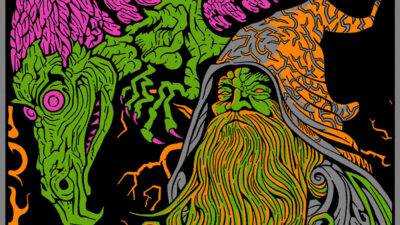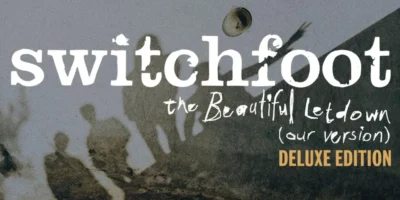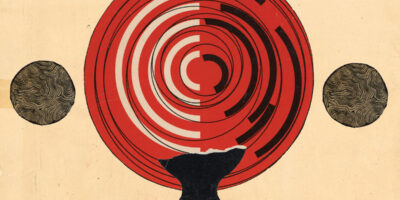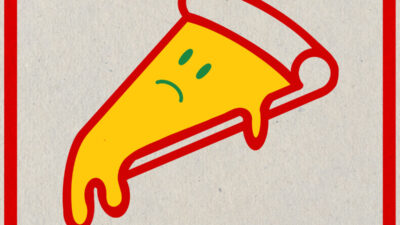Genre: Progressive Electronic, Art Pop
Favorite Tracks: “Long Road Home,” “I Don’t Love Me Anymore,” “No Nightmares,” “Tales From The Trash Stratum,” “Imago,” “Lost But Never Alone,” “Nothing’s Special”
Daniel Lopatin has always had one foot planted firmly in both the past and the future simultaneously, engaging in retrofuturism as a way to contrast the way we envisioned the future in decades past with the disappointments and discomforting realities of our present. Oneohtrix Point Never is all about recapturing that wonder and untapped possibility of early synthesizer music by drawing inspiration from genres like new age music and fusing a distinctly retro sound with modern production techniques to turn something dated into something completely new and exciting. This often results in taking sounds that inspired him growing up and mutates them into strange, often challenging new forms—music that evokes the warm analog glow of synthesizer music from the ‘80s while constantly subverting listener expectations with experimental sound design that sounds more like alien technology than it does any recognizable human instrument. Lopatin’s work is always somewhat nostalgic in the way it incorporates genres and mundane sonic textures of the past, while also acknowledging that nostalgia alone “fails to be an essence. It can be fun, but it’s fleeting and it doesn’t work out, because you always have to go back to the present.”
His new record, MAGIC ONEOHTRIX POINT NEVER, is perhaps the most fixated on this intermingling of past and future of any of his releases to date. Inspired by the Boston radio station Magic 106.7, which also served as the inspiration for his stage name, MAGIC ONEOHTRIX POINT NEVER plays like a radio broadcast from another more musically interesting dimension, with experimental pop music seamlessly interwoven with Lopatin’s usual abstract electronics and warped vocal samples of radio station DJs announcing format changes.
Since Lopatin’s music attempts to exist in the uncanny valley between past and future, these broadcast clips announcing one genre format being permanently retired for something new is a perfect thematic direction for this record. That energy radiates amidst this moment of limbo we all find ourselves in during this unprecedented year in our history, where we are stuck in the negative space between a past we cannot return to and an uncertain future. The most poignant of these clips plays during “Cross Talk II,” in which the DJ describes how “the music we all grew up listening to doesn’t relate to our adult reality and our new dreams,” lamenting that “the music we grew up with doesn’t speak for us and what we’re now going through… and now simply we all grew up to be something else.” There’s something incredibly vulnerable about these clips that Lopatin calls “eulogies” that is a stark contrast to the usual slick, upbeat, commercial tone of radio broadcasts—an admission of failure and also a recognition that not only are we all changing, but that the world is constantly changing around us and will leave us behind if we aren’t careful.
In an era of streaming media where instant gratification is always a click away, we have lost touch with the heightened jolt of excitement that comes from hearing a new song on the radio that we love instantly, and MAGIC ONEOHTRIX POINT NEVER attempts to recreate that feeling of electricity that comes with our lack of control over the radio format by having these moments of thrilling pop music suddenly appear from the out of the sea of “background music” of this magical FM broadcast. Executive produced by his good friend Abel Tesfaye, better known as pop superstar The Weeknd, MAGIC ONEOHTRIX POINT NEVER has some of Lopatin’s most accessible pop songs to date, but they still manage to feel completely of a piece with the album’s most dissonant and abstract moments. Standout tracks like “I Don’t Love Me Anymore,” which sounds like a pop punk song being bounced off a series of distant satellites, or the crooning, ‘80s-inspired duet with the Weeknd, “No Nightmares,” deliver straightforward pop satisfaction that we rarely get from Lopatin before eventually dissolving back into the ambient flow of the record, like memories fading into the ether.
OPN albums are always in some state of mutation and transformation, constantly either taking something traditionally beautiful and muddying it up or taking something chaotic and distinctly unmusical and giving it structure, “so it has a kind of comprehensible pulsation.” Songs like “Imago” and “Tales from The Trash Stratum” do this brilliantly. Lopatin manages to take some of the most incomprehensible and disorienting sonic landscapes and transform this seemingly unorganized noise into something cinematic and emotional, bringing in a sweeping string arrangement or a gorgeous synth melody as a balm to help give direction and calm to the chaos he has conjured. These moments of tranquility and beauty rarely last long, though. They are intentionally as fleeting and hard to grasp as the “fictitious memories” that come from our nostalgia for the past. Any time you feel like you start to grasp this album, it pulls the rug out from under you—not to push you away but to get you to keep questioning and engaging with it.
While it may not quite reach the same mystical heights as his most beloved records like 2011’s REPLICA or 2013’s R PLUS 7, MAGIC ONEOHTRIX POINT NEVER is much more than just a retread of Lopatin’s go-to techniques and motifs—rather it is a synthesis of the musical and philosophical ideas that have always been present in his work with the new musical perspectives brought by his collaborators. His recent years dabbling with pop music production and movie scores haven’t made him any less creative and boundary-pushing. Instead, his more traditional pop impulses have somehow managed to find a home side-by-side with some of his most audacious ideas ever. After all, this is the same guy who said “every song is an opportunity to freak somebody out,” so even as he allows his music to take more commercial and conventional forms, he still maintains the playful sense of anarchy that makes his music so compelling. That’s why the FM radio motifs feel like something much more personal than just a gimmick or lazy framing device for the album: it only makes sense that the kid who was originally inspired by listening to local free form and college radio stations that “could go in one fell swoop from … Charles Mingus to Anal Cunt to Phil Collins” would aspire to create a record that captures that same feeling of free-wheeling creativity.
















Comments